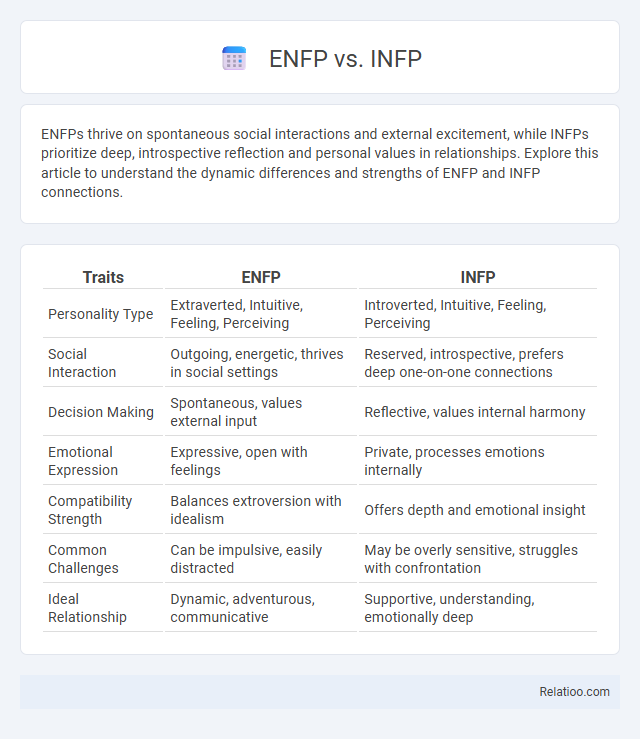ENFPs thrive on spontaneous social interactions and external excitement, while INFPs prioritize deep, introspective reflection and personal values in relationships. Explore this article to understand the dynamic differences and strengths of ENFP and INFP connections.
Table of Comparison
| Traits | ENFP | INFP |
|---|---|---|
| Personality Type | Extraverted, Intuitive, Feeling, Perceiving | Introverted, Intuitive, Feeling, Perceiving |
| Social Interaction | Outgoing, energetic, thrives in social settings | Reserved, introspective, prefers deep one-on-one connections |
| Decision Making | Spontaneous, values external input | Reflective, values internal harmony |
| Emotional Expression | Expressive, open with feelings | Private, processes emotions internally |
| Compatibility Strength | Balances extroversion with idealism | Offers depth and emotional insight |
| Common Challenges | Can be impulsive, easily distracted | May be overly sensitive, struggles with confrontation |
| Ideal Relationship | Dynamic, adventurous, communicative | Supportive, understanding, emotionally deep |
Overview of ENFP and INFP Personality Types
ENFP and INFP are both intuitive and feeling personality types within the Myers-Briggs Type Indicator, with ENFPs characterized by extraversion, enthusiasm, and a strong drive for exploring new possibilities, while INFPs exhibit introversion, deep introspection, and a focus on personal values. ENFPs often thrive in dynamic social environments, energizing others and seeking meaningful connections, whereas INFPs prefer solitary reflection and are driven by inner ideals to create authenticity in their lives. Understanding these core differences can help you leverage your strengths and navigate interpersonal desires effectively.
Key Similarities Between ENFP and INFP
ENFP and INFP personalities both exhibit strong intuitive and feeling traits, enabling deep empathy and creativity in their interactions and decision-making processes. You share a passion for meaningful connections and a preference for exploring possibilities and values over concrete details. Both types prioritize authenticity, emotional depth, and personal growth, making them highly aligned in understanding desires and motivations.
Core Differences: ENFP vs INFP
ENFPs are energized by external interactions and thrive on spontaneous adventures, while INFPs prefer introspection and deep reflection to understand their inner values. Your decision-making as an ENFP leans toward exploring possibilities and engaging with diverse perspectives, whereas INFPs prioritize authenticity and emotional alignment in choices. Desire manifests more outwardly in ENFPs through social connection, compared to the INFP's inward focus on personal meaning and idealism.
Cognitive Functions: How ENFPs and INFPs Think
ENFPs primarily use Extraverted Intuition (Ne) to explore possibilities and generate innovative ideas, while their Introverted Feeling (Fi) anchors personal values and authenticity. INFPs lead with Fi, deeply processing emotions and aligning actions with their moral compass, complemented by Introverted Intuition (Ni) that provides insightful patterns and future-oriented perspectives. Desire in both types is driven by a need for meaningful connections and self-expression, but ENFPs seek external engagement and novel experiences, whereas INFPs pursue internal harmony and idealistic authenticity.
Communication Styles of ENFPs vs INFPs
ENFPs communicate with enthusiastic expressiveness, thriving on dynamic interactions that fuel their extraverted intuition and desire for connection. INFPs prefer thoughtful, introspective communication, often sharing deeper emotions and values in more intimate, meaningful contexts. While ENFPs seek energetic exchanges to explore possibilities, INFPs communicate with a desire for authenticity and emotional depth.
Approach to Relationships and Friendships
ENFPs approach relationships and friendships with enthusiasm and openness, often seeking new experiences and deep, energizing connections. INFPs prioritize emotional depth and authenticity, valuing meaningful bonds that align with their core values and idealism. Your desire for connection drives you to balance the ENFP's social energy with the INFP's introspective warmth, fostering relationships that are both dynamic and deeply genuine.
Career Paths for ENFP and INFP Personalities
ENFPs thrive in dynamic careers like marketing, entrepreneurship, and public relations due to their extraverted intuition and strong people skills, driving innovation and collaboration. INFPs excel in creative and helping professions such as writing, counseling, and art therapy, leveraging their introverted feeling and deep empathy to foster personal growth and meaningful connections. Desire, as a motivational force, influences both types by aligning their career choices with intrinsic values and aspirations, guiding ENFPs toward impact-driven roles and INFPs toward purpose-filled vocations.
Strengths and Challenges of ENFPs and INFPs
ENFPs excel in social interaction, creativity, and adaptability, thriving in dynamic environments where they can explore new ideas and connect with others, but they may struggle with focus and follow-through on long-term projects. INFPs possess deep empathy, strong values, and introspective creativity, which drive meaningful connections and authentic self-expression, yet they often face challenges in assertiveness and handling external criticism. Understanding these strengths and challenges empowers you to leverage the unique qualities of both ENFPs and INFPs to achieve personal growth and balanced relationships.
Tips for ENFP–INFP Compatibility and Interaction
ENFPs thrive on spontaneous social interaction and external stimulation, while INFPs value deep, introspective conversations and emotional authenticity, making mutual respect for each other's communication styles key for compatibility. ENFPs should practice patience and offer gentle encouragement to help INFPs open up, whereas INFPs can foster connection by sharing values and feelings more openly to match the ENFP's enthusiasm. Prioritizing clear boundaries, active listening, and embracing each partner's emotional expression enhances harmony between ENFP and INFP individuals.
Frequently Asked Questions: ENFP vs INFP
ENFPs and INFPs both belong to the NF (Intuitive-Feeling) temperament but differ primarily in their cognitive functions and social energy; ENFPs are extroverted, energized by social interactions, and use Extraverted Intuition, while INFPs are introverted, valuing deep internal reflection with dominant Introverted Feeling. Frequently asked questions often explore how ENFPs handle spontaneity compared to INFPs' preference for thoughtful planning, or how their emotional responses differ in relationships, with ENFPs typically expressing feelings more openly and INFPs processing emotions privately. Understanding these distinctions helps clarify why ENFPs seek external stimulation and variety, whereas INFPs prioritize authenticity and inner harmony in decision-making and daily life.

Infographic: ENFP vs INFP
 relatioo.com
relatioo.com